- Home
- Francine Rivers
The Priest: Aaron Page 2
The Priest: Aaron Read online
Page 2
“You hate me, don’t you, Aaron?”
Aaron understood Egyptian even though Moses didn’t understand Hebrew. The question had given him pause. “No. Not hate.” He hadn’t felt anything but distrust. “What are you doing here?”
“I belong here.”
Aaron had found himself furious at Moses’ answer. “Did we all risk our lives so you could end up in a mud pit?”
“If I’m to try to free my people, shouldn’t I get to know them?”
“Ah, so magnanimous.”
“You need a leader.”
Their mother defended Moses with every breath. “Didn’t I tell you my son would choose his own people over our enemies?”
Wouldn’t Moses be of more use in the palace speaking on behalf of the Hebrews? Did he think he would gain Pharaoh’s respect by working alongside slaves? Aaron didn’t understand Moses, and after years of disparity in the way they lived, he wasn’t sure he liked him.
But why would he? What was Moses really after? Was he Pharaoh’s spy sent to learn whether these wretched Israelites had plans to align themselves with Egypt’s enemies? The thought may have occurred to them, but they knew they would fare no better at Philistine hands.
Where is God when we need Him? Far off, blind and deaf to our cries for deliverance!
Moses might have walked the great halls as the adopted son of Pharaoh’s daughter, but he had inherited the Levite blood and the Levite temper. When he saw an Egyptian beating a Levite slave, he became a law unto himself. Aaron and several others watched in horror as Moses struck the Egyptian down. The others fled while Moses buried the body in the sand.
“Someone has to defend you!” Moses said as Aaron helped him hide the evidence of his crime. “Think of it. Thousands of slaves rising up against their masters. That’s what the Egyptians fear, Aaron. That’s why they load you down and try to kill you with work.”
“Is this the kind of leader you want to be? Kill them as they kill us?” Was that the way to deliverance? Was their deliverer to be a warrior leading them into battle? Would he put a sword in their hands? The rage that had built over the years under slavery filled Aaron. Oh, how easy it would be to give in to it!
Word spread like fine sand blown before a desert wind, eventually reaching the ears of Pharaoh himself. When Hebrews fought among themselves the next day, Moses tried to intercede and found himself under attack. “Who appointed you to be our prince and judge? Do you plan to kill me as you killed that Egyptian yesterday?” The people didn’t want Moses as their deliverer. In their eyes, he was an enigma, not to be trusted.
Pharaoh’s daughter couldn’t save Moses this time. How long could a man survive when he was hated and hunted by Pharaoh, and envied and despised by his brethren?
Moses disappeared into the wilderness and was never heard from again.
He didn’t even have time to say good-bye to the mother who’d believed he had been born to deliver Israel from slavery. And Moses took their mother’s hopes and dreams with him into the wilderness. She died within the year. The fate of Moses’ Egyptian mother was unknown, but Pharaoh lived on and on, continuing to build his storage cities, monuments, and grandest of all, his tomb. It was scarcely finished when the sarcophagus containing Pharaoh’s embalmed body was carried to the Valley of the Kings, followed by an entourage of thousands bearing golden idols, possessions, and provisions for an afterlife thought to be even grander than the one he had lived on earth.
Now Raamses wore the serpent crown and held a sword over their heads. Cruel and arrogant, he preferred grinding his heel into their backs instead. When Amram could not rise from the pit, he was smothered in the mud.
Aaron was eighty-three, a thin reed of a man. He knew he would die soon, and his sons after him, and their sons down through the generations.
Unless God delivered them.
Lord, Lord, why have You abandoned Your people?
Aaron prayed out of desperation and despair. It was the only freedom he had left, to cry out to God for help. Hadn’t God made a covenant with Abraham and Isaac and Jacob? Lord, Lord, hear my prayer! Help us! If God existed, where was He? Did He see the bloody stripes on their backs, the worn-down, worn-out look in their eyes? Did he hear the cries of Abraham’s children? Aaron’s father and mother had clung to their faith in the unseen God. Where else can we find hope, Lord? How long, O God, how long before You deliver us? Help us. God, why won’t You help us?
Aaron’s father and mother had long since been buried beneath the sand. Aaron had obeyed his father’s last wishes and married Elisheba, a daughter from among the tribe of Judah. She had given him four fine sons before she died. There were days when Aaron envied the dead. At least they were at rest. At least their unceasing prayers had finally stopped and God’s silence no longer hurt.
Someone lifted his head and gave him water. “Father?”
Aaron opened his eyes and saw his son Eleazar above him. “God spoke to me.” His voice was scarcely a whisper.
Eleazar leaned down. “I couldn’t hear you, Father. What did you say?”
Aaron wept, unable to say more.
God had finally spoken, and Aaron knew his life would never be the same.
Aaron gathered his four sons—Nadab, Abihu, Eleazar, and Ithamar—and his sister, Miriam, and told them God had commanded him to go to meet Moses in the wilderness.
“Our uncle is dead,” Nadab said. “It was the sun speaking to you.”
“It’s been forty years, Father, without a word.”
Aaron held up his hand. “Moses is alive.”
“How do you know it was God who spoke to you, Father?” Abihu leaned forward. “You were out in the sun all day. It wouldn’t be the first time the heat got to you.”
“Are you sure, Aaron?” Miriam cupped her cheeks. “We have been hoping for so long.”
“Yes. I’m certain. No one can imagine a voice like that. I cannot explain, nor do I have the time to try. You must all believe me!”
They all spoke at once.
“There are Philistines beyond the borders of Egypt.”
“You can’t survive in the wilderness, Father.”
“What will we tell the other elders when they ask after you? They will want to know why we didn’t stop our father from such folly.”
“You won’t make it to the trade route before you’re stopped.”
“And if you do, how will you survive?”
“Who will go with you?”
“Father, you’re eighty-three years old!”
Eleazar put his hand on Aaron’s arm. “I’ll go with you, Father.”
Miriam stamped her foot. “Enough! Let your father speak.”
“No one will go with me. I go alone, and God will provide.”
“How will you find Moses? The wilderness is a vast place. How will you find water?”
“And food. You can’t carry enough for that kind of journey.”
Miriam rose. “Would you try to talk your father out of what God instructed?”
“Sit, Miriam.” His sister merely added to the confusion, and Aaron could speak for himself. “God called me to this journey; surely God will show me the way.” Hadn’t he prayed for years? Maybe Moses would know something. Maybe God was finally going to help His people. “I must trust in the God of Abraham, Isaac, and Jacob to lead me.” He spoke with more confidence than he felt, for their questions troubled him. Why should they doubt his word? He must do as God said and go. Quickly, before courage failed him.
Carrying a skin of water, seven small loaves of unleavened barley bread, and his staff, Aaron left before the sun came up. He walked all day. He saw Egyptians, but they paid him no attention. Nor did he allow his steps to falter at the sight of them. God had given him purpose and hope. Weariness and desolation no longer oppressed him. He felt renewed as he walked. God exists. God spoke. God had told him where to go and whom he was to meet: Moses!
What would his brother be like? Had he spent all forty years in the wildernes
s? Did he have a family? Did Moses know Aaron was coming? Had God spoken to him as well? If not, what was he to say to Moses when he found him? Surely God would not send him so far without purpose at the end. But what purpose?
His questions made him think of other things. He slowed his steps, troubled. It had been easy to walk away. No one had stopped him. He had taken up his staff, shouldered a skin of water and a pouch of bread, and headed out into the desert. Maybe he should have brought Miriam and his sons with him.
No. No. He must do exactly as God said.
Aaron walked all day, day after day, and slept in the open at night, eyes on the stars overhead, alone in silence. Never had he been so alone, or felt so lonely. Thirsty, he sucked on a small flat stone to keep his mouth from going dry. How he wished he could raise his hand and have a boy run to him with a skin of water. His bread was almost gone. His stomach growled, but he was afraid to eat until later in the afternoon. He didn’t know how far he had to go and whether his supply of bread would hold out. He didn’t know what to eat out here in the desert. He didn’t have the skills to hunt and kill animals. He was tired and hungry and beginning to wonder if he really had heard God’s voice or just imagined it. How many more days? How far? The sun beat down relentlessly until he looked for escape in a cleft of rocks, miserable and exhausted. He couldn’t remember the sound of God’s voice.
Was it all his imagination, birthed by years of misery and a dying hope that a Savior would come and deliver him from slavery? Maybe his sons were right and he’d been suffering from the heat. He was certainly suffering now.
No. He had heard God’s voice. He had been on the point of exhaustion and heatstroke many times in his life, but he had never heard a voice like that one:
Go out into the wilderness to meet Moses. Go. Go.
He set off again, walking until nightfall and finding a place to rest. The inexorable heat gave way to a chill that gnawed at his bones and made him shiver. When he slept, he dreamed of his sons sitting with him at the table, laughing and enjoying one another while Miriam served bread and meat, dried dates and wine. He awakened in despair. At least in Egypt, he had known what to expect; every day had been the same with overseers to regulate his life. He had been thirsty and hungry many times, but not as he was now, with no respite, no encouraging companion.
God, did You bring me out into the wilderness to kill me? There is no water, just this endless sea of rocks.
Aaron lost count of the days, but he took hope in that every day there seemed to be just enough water and food to keep him going. He headed north and then east into Midian, sustained by infrequent oases, and leaning more heavily on his staff with each day. He didn’t know how far he had come, or how far he had to go. He only knew he would rather die in the wilderness than turn back now. What hope remained was fixed on finding his brother. He longed to see Moses as intently as he had longed for a long draught of water and hunk of bread.
When his water was down to a few drops and his bread was gone, he came to a wide plain before a jagged mountain. Was that a donkey and a small shelter? Aaron rubbed the sweat from his eyes and squinted. A man sat in the doorway. He stood, staff in hand, and came out into the open, his head turned toward Aaron. Hope made Aaron forgot his hunger and thirst. “Moses!” Oh, Lord, Lord, let it be my brother! “Moses!”
The man came toward him at a run, arms outstretched. “Aaron!”
It was like hearing the voice of God. Laughing, Aaron came down the rocky slope, his strength renewed like an eagle’s. He was almost running when he reached his brother. They fell into one another’s arms. “God sent me, Moses!” Laughing and sobbing, he kissed his brother. “God sent me to you!”
“Aaron, my brother!” Moses held tight, weeping. “God said you would come.”
“Forty years, Moses. Forty years! We all thought you were dead.”
“You were glad to see me go.”
“Forgive me. I am glad to see you now.” Aaron drank in the sight of his younger brother.
Moses had changed. He was no longer dressed like an Egyptian, but wore the long dark robes and head covering of a nomad. Swarthy, face lined with age, his dark beard streaked with white, he looked foreign and humbled by years of desert life.
Aaron had never been so glad to see anyone. “Oh, Moses, you are my brother. I am glad to see you alive and well.” Aaron wept for the lost years.
Moses’ eyes grew moist and tender. “The Lord God said you would be. Come.” He took Aaron by the arm. “You must rest and have something to eat and drink. You must meet my sons.”
Moses’ dark and foreign wife, Zipporah, served them. Moses’ son Gershom sat with them, while Eliezer lay pale and sweating on a pallet at the back of the tent.
“Your son is ill.”
“Zipporah circumcised him two days ago.”
Aaron winced. Eliezer meant “my God is help.” But in which God did Moses place his hope? Zipporah sat beside her son, dark eyes downcast, and dabbed his forehead with a damp cloth. Aaron asked why Moses had not done it himself when his son was eight days old as the Jews had done since the days of Abraham.
Moses bowed his head. “It is easier to remember the ways of your people when you dwell among them, Aaron. As I learned when I circumcised Gershom, Midianites consider the rite repugnant, and Jethro, Zipporah’s father, is a priest of Midian.” He looked at Aaron. “In deference to him, I did not circumcise Eliezer. When God spoke to me, Jethro gave me his blessing, and we left the tents of Midian. I knew my son must be circumcised. Zipporah argued against it and I delayed, not wanting to press my ways on her. I didn’t see it as rebellion until the Lord Himself sought to take my life. I told Zipporah that unless my sons both bore the mark of the Covenant on their flesh, I would die and Eliezer would be cut off from God and His people. Only then did she herself take the flint to our son’s flesh.”
Troubled, Moses looked at the feverish boy. “My son would not even remember how the mark came to be on his flesh had I obeyed the Lord instead of bending to others. He suffers now because of my disobedience.”
“He will heal soon, Moses.”
“Yes, but I will remember the cost to others of my disobedience.” Moses looked out the doorway to the mountain and then at Aaron. “I have much to tell you when you are not too tired to listen.”
“My strength returned the moment I saw you.”
Moses took up his staff and rose, and Aaron followed. When they stood in the open, Moses stopped. “The God of Abraham, Isaac, and Jacob appeared to me in a burning bush on that mountain,” Moses said. “He has seen the affliction of Israel and is come to deliver them from the power of the Egyptians, to bring them into a land flowing with milk and honey. He is sending me to Pharaoh so that I may bring His people out of Egypt to worship Him at this mountain.” Moses gripped his staff and rested his forehead against his hands as he spoke all the words the Lord had spoken to him on the mountain. Aaron felt the truth of them in his soul, drinking them in like water. The Lord is sending Moses to deliver us!
“I pleaded with the Lord to send someone else, Aaron. I said who am I to go to Pharaoh? I said my own people will not believe me. I told him I have never been eloquent, that I’m slow of speech and tongue.” He let out his breath slowly and faced Aaron. “And the Lord whose name is I AM THE ONE WHO ALWAYS IS said you will be my spokesman.”
Aaron felt a sudden rush of fear, but it subsided in the answer of a lifetime prayer. The Lord had heard the cry of His people. Deliverance was at hand. The Lord had seen their misery and was about to put an end to it. Aaron was too filled with emotion to speak.
“Do you understand what I’m saying to you, Aaron? I’m afraid of Pharaoh. I’m afraid of my own people. So the Lord has sent you to stand with me and be my spokesman.”
The question hung unspoken between them. Was he willing to stand with Moses?
“I am your older brother. Who better to speak for you than I?”
“Are you not afraid, Brother?”
“
What does a slave’s life matter in Egypt, Moses? What has my life ever mattered? Yes, I’m afraid. I have been afraid all my life. I’ve bent my back to taskmasters, and felt the lash when I dared look up. I speak boldly enough in the privacy of my own house and among my brethren, but it comes to naught. Nothing changes. My words are but wind, and I thought my prayers were, too. Now, I know better. This time will be different. It won’t be the words of a slave that are heard from my lips, but the Word of the Lord, the God of Abraham, Isaac, and Jacob!”
“If they don’t believe us, the Lord has given me signs to show them.” Moses told him how his staff had become a snake and his hand had become leprous. “And if that is not enough, when I pour water from the Nile, it will become blood.”
Aaron didn’t ask for a demonstration. “They will believe, just as I believe.”
“You believe me because you are my brother, and because God sent you to me. You believe because God has changed your heart toward me. You have not always looked at me as you do now, Aaron.”
“Yes, because I thought you were free when I wasn’t.”
“I never felt at home in Pharaoh’s house. I wanted to be among my own people.”
“And we scorned and rejected you.” Perhaps it was living among two separate peoples and being accepted by neither that made Moses so humble. But he must do as God commanded, or the Hebrews would go on as before, toiling in the mud pits and dying with their faces in the dust. “God has chosen you to deliver us, Moses. And so you shall. Whatever God tells you, I will speak. If I have to shout, I will make the people hear.”
Moses looked up at the mountain of God. “We will start for Egypt in the morning. We will gather the elders of Israel and tell them what the Lord has said. Then we will all go before Pharaoh and tell him to let God’s people go into the wilderness to sacrifice to the Lord our God.” He shut his eyes as though in pain.

 An Echo in the Darkness
An Echo in the Darkness A Lineage of Grace
A Lineage of Grace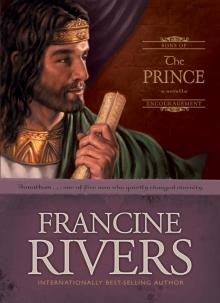 The Prince: Jonathan
The Prince: Jonathan Bridge to Haven
Bridge to Haven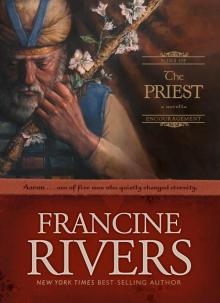 The Priest: Aaron
The Priest: Aaron Her Mother's Hope
Her Mother's Hope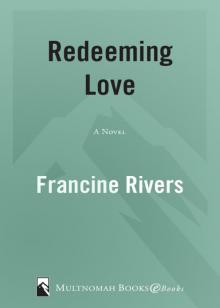 Redeeming Love
Redeeming Love The Scarlet Thread
The Scarlet Thread The Masterpiece
The Masterpiece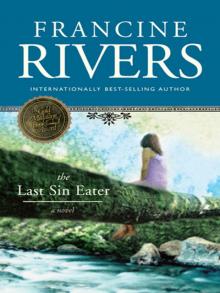 The Last Sin Eater
The Last Sin Eater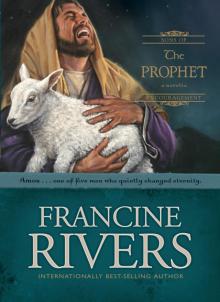 The Prophet: Amos
The Prophet: Amos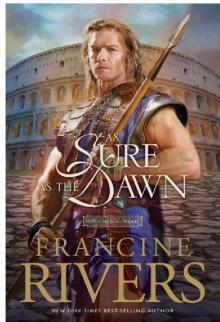 As Sure as the Dawn
As Sure as the Dawn Her Daughter's Dream
Her Daughter's Dream A Voice in the Wind
A Voice in the Wind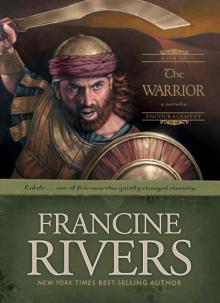 The Warrior: Caleb
The Warrior: Caleb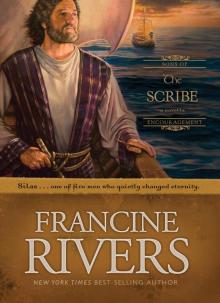 The Scribe: Silas
The Scribe: Silas And the Shofar Blew
And the Shofar Blew The Atonement Child
The Atonement Child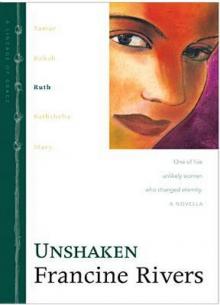 Unshaken_Ruth
Unshaken_Ruth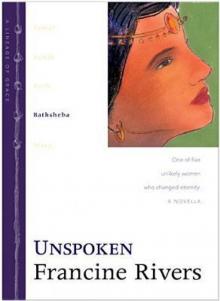 Unspoken_Bathsheba
Unspoken_Bathsheba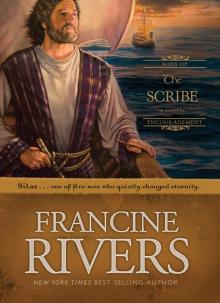 The Scribe
The Scribe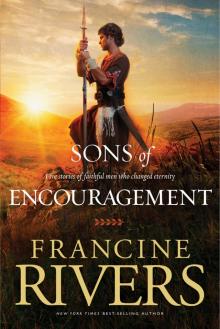 Sons of Encouragement
Sons of Encouragement The Shoe Box
The Shoe Box Sycamore Hill
Sycamore Hill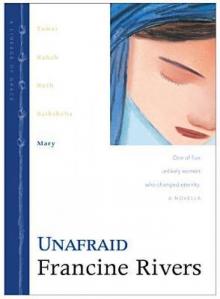 Unafraid_Mary
Unafraid_Mary Marta's Legacy Collection
Marta's Legacy Collection